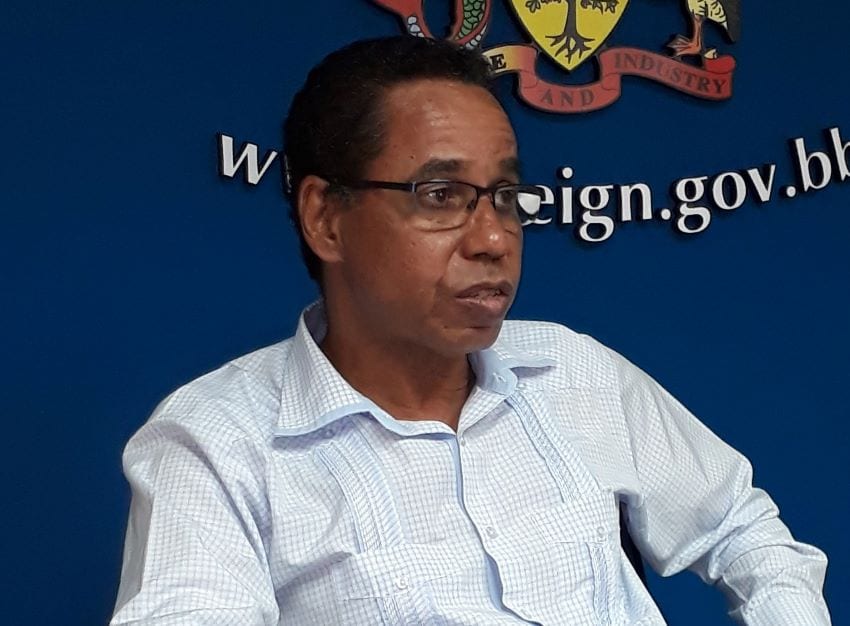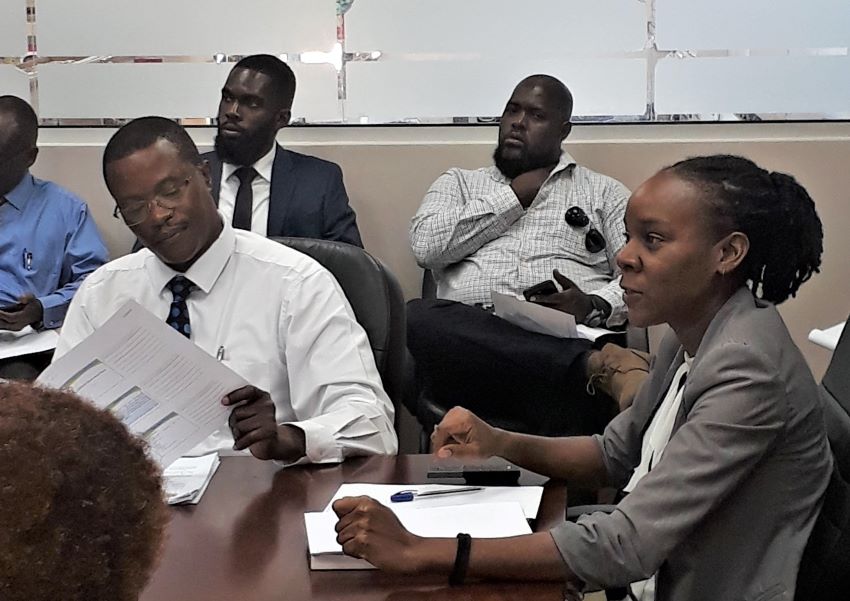
Is it possible for the people of the Caribbean to achieve socio-economic cohesion in our lifetime? For decades, this and other questions have dogged the region since the collapse of the Federation in 1962. But, some 46 years after the establishment of the Caribbean Community (CARICOM), the region is now better poised to achieve economic resilience, thanks largely to assistance from the CARICOM Development Fund (CDF).
The CDF, which was established in November 2008, was one of the agencies identified by regional leaders at their Castries summit in July 2019, to provide vital support to strengthen member states within the CSME.
The proposed new role for the fund was outlined recently by CDF Senior Economist, Dr. Laverne McFarlane, during the National Consultation on the Draft Cohesion Policy for Barbados, at the CSME Unit in Haggatt Hall. Member states have held National Consultations on the Draft Cohesion Policy over the past year.
The meeting brought together key stakeholders from the private and public sectors involved in implementing the CARICOM Single Market and Economy (CSME), including the Prime Minister’s Office, the Ministries of Home Affairs, Commerce, Finance, Economic Affairs and Investment, Labour, Agriculture and Food Security, and Foreign Affairs and Foreign Trade.
Other agencies represented were the Immigration Department, Corporate Affairs and Intellectual Property Office, the Private Sector Association, the Congress of Trade Unions and Staff Associations, TVET Council, the Barbados Statistical Service, the Ombudsman, the Caribbean Policy Development Centre and CARICOM Youth Ambassadors.
The consultation was also designed to frame policies that would help the CDF provide technical and financial assistance to disadvantaged countries, regions and sectors, under Article 158 of the Revised Treaty of Chaguaramas.
The fund is also intended to address social and economic disparities that may be caused by the formal implementation of the CSME.
CDF funding comes from CARICOM member states, as well as donor partners, and seeks to address disadvantages, by promoting balanced economic and social development.
Giving some background on the CDF at the meeting, Barbados’ Ambassador to CARICOM, David Comissiong, explained: “The CDF emerged at a time when CARICOM was moving towards a Single Market and Single Economy, and the lesser developed countries (LDCs) of CARICOM, rehearsing an old argument that went way back to the establishment of CARIFTA, made the point that the implementation of the CSME was likely to have negative consequences for their countries. They were likely to have been placed in a disadvantaged position by larger and better resourced companies in the more developed countries that were likely to better exploit economic opportunities in their companies.
“… As a result of that argument, we got the birth of the Caribbean Development Bank as a mechanism that would not exclusively pay significant attention to providing developmental resources to the lesser developed countries, because it was felt at the time that the free trade regime would negatively impact the LDCs, and they made their case at that time.”
The envoy told the meeting that there was need for stakeholders to focus on historical underdevelopment, the new climate change phenomenon, man-made disasters, crime, and inter-generational poverty, if there was hope for member states to achieve economic and social development.

In fact, the region is still reeling from the external pressures which have had a deleterious impact on economies, causing downward economic spiralling, and as in the case with Barbados and other nations, have found themselves under an International Monetary Fund programme.
Ambassador Comissiong noted that Prime Minister Mia Amor Mottley has gone on record saying that development of the CDF was critical for it to become a very powerful agency, providing finance and technical assistance to all CARICOM countries, including Barbados.
He added that Ms. Mottley sees the CDF as playing a pivotal role in creating new financial instruments to mobilize and leverage some of the US$47 billion in savings in banks and other financial institutions across the region.
The importance of the fund to facilitate cohesion, and jumpstart regional growth was stressed by CDF Senior Economist, Dr. McFarlane, who admitted that, at times, integration programmes could be “a little bit dislocative”.
“So, you may find some benefiting more than others, and in that regard you tend to find that there is a gap between those who are benefiting and those who are benefiting less or not at all, so that creates that gap in terms of the advantaged and the disadvantaged,” she added.
The senior economist further explained that the fund targeted those who were disadvantaged by reason of vulnerability, through size or structure, or from natural disasters.
The overall objective, however, is to promote balanced, economic and social development, within and across member states of CARICOM, to improve on economic efficiency, political stability and social equity.

She explained that member states could exploit their full potential, and therefore, improve on their economies within CARICOM, through human capacity and business development, local infrastructure, energy efficiency and renewable energy.
Dr. McFarlane said the CDF would embark on an analysis of territorial development needs and national cohesion programmes, and implement a number of pilot projects over the programme period to disadvantaged countries, regions and communities, to facilitate interventions in respective member countries.
Disadvantaged communities, she added, were towns with significant social problems and long-term unemployment, youth unemployment or underemployment, poverty and social deprivation.
In terms of disadvantaged sectors, she explained this would mean the type of regional or national economic activities that were undergoing structural adjustments “based on a percentage decline in employment and productivity over a three-year period”.
In addition, the CDF would consider what currently exists in the national policy framework, and from donor partners, in terms of the projects and programmes that they were undertaking in the member states, so as to identify and carve out the added benefit that the cohesion policy would bring to the respective member state.
Over the next few months, CDF officials will work with member states to finalize the policy, and ensure that the necessary resources are in place to bring about socio-economic cohesion and other aspects of the CSME, for which Barbados has lead responsibility. They will also start any necessary pilot projects and national programmes that are warranted.
